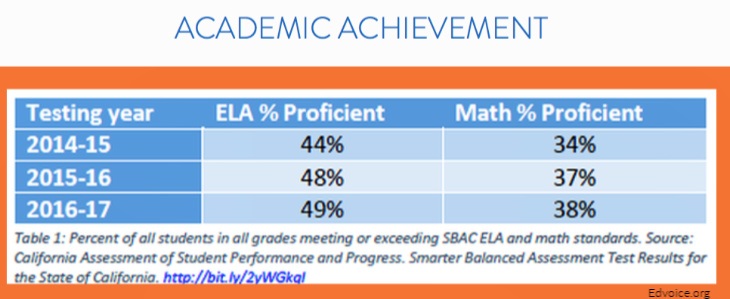Every single day, teachers around the state of California use data in different forms to measure the effectiveness of what is happening inside their classrooms. Assessments offer teachers valuable insights as to what students are learning in order for skills to be retaught and any disparities addressed. At a higher level, students around the state have their skills measured yearly as well. Every year, students around the state of California are tested in their English Language Arts and Mathematics skills through the Smarter Balanced Assessment Consortium, or SBAC test. This test is meant to assess the mastery of students based on the Common Core State Standards schools are responsible for teaching. The testing administration has put together various resources for parents to learn more about the basics of this test and why it’s helpful.
The data for the 2018-19 teaching and testing cycle was released earlier this month, and the results offer us a look into the experiences our students are having in the classroom. The Test Results At a Glance for Mathematics can be found here as well as the results for English Language Arts. There are various resources available on the site in English and Spanish that are helpful in understanding the results provided.
Overall, the data tells us that growth around the state has been slow. This is the fifth year that the tests are being administered, and little to no progress has been demonstrated across “ethnic, racial, and other student groups,” as reported by Ed Source earlier this month. Additionally, there were some positive news in regards to the achievement Hispanic students had on the exam given that, “The notable exception is Hispanic students, whose 5-year proficiency rate in both English language arts and math rose faster than those of white and Asian students,” the same report added. While this is great news for Hispanic students, my hope that we can continue to spread this growing trend to students of other marginalized identities so that their mastery can be demonstrated through the SBAC as well.
As a parent, I am always in search of ways that I can engage with my daughter’s education and insert myself into the learning process she is experiencing at her school. If you’re interested in further supporting your student in this context, check out the few suggestions below:
- Review your students’ results and initiate a conversation with your child’s teacher on what they can be doing at home to practice the skills assessed.
- Search for and review your school site’s scores and continue conversations about how to improve them.
- Spend time with your student having them explore the various practice tests available online and review answers together. This initial investment can go a long way.
Daniela Felix
Latest posts by Daniela Felix (see all)
- The Importance of Mid Year Data for Teachers, Students, and Families - December 18, 2019
- Las Familias Deben Participar en la Mejora de los Resultados de las Pruebas SBAC de California - December 10, 2019
- La Guia de los Aprendices de Inglés de California es un Recurso Útil para los Maestros - December 4, 2019
- California’s English Learner Roadmap Is a Helpful Resource for Teachers - December 2, 2019
- Families Need To Be Involved in Improving California’s SBAC Test Results - November 27, 2019

